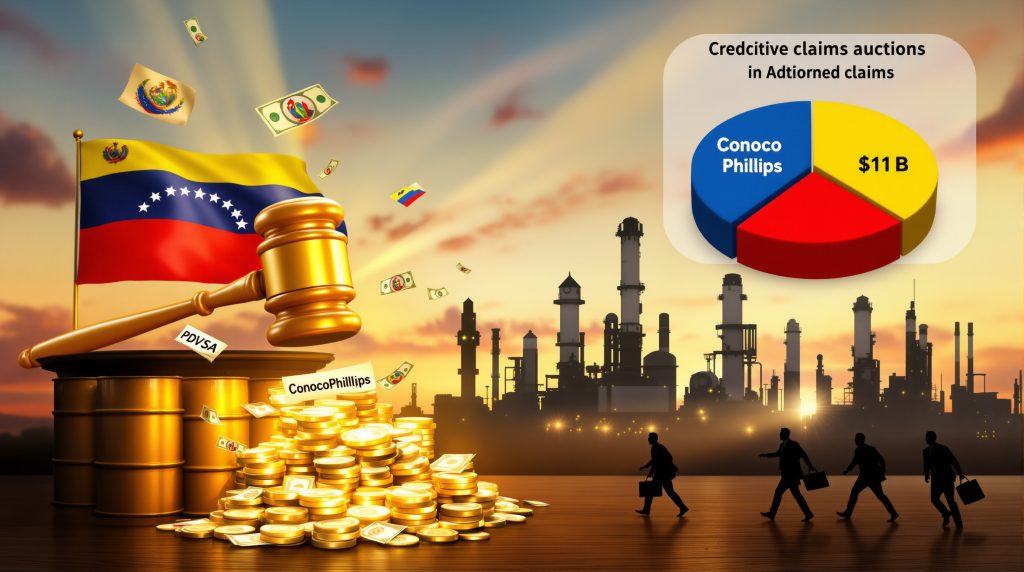The PDVSA Citgo Auction: Understanding Venezuela's Oil Asset Battle The Citgo auction represents a pivotal moment in Venezuela's economic history, as the country's most valuable foreign asset faces forced sale through U.S. court proceedings. This high-stakes auction process stems from years of litigation following Venezuela's nationalization policies and subsequent defaults on international obligations. The outcome will significantly impact Venezuela's future oil industry positioning, creditor recoveries, and U.S.-Venezuela relations. Citgo's strategic importance cannot be overstated—with refineries capable of processing over 800,000 barrels of crude oil daily, it has long served as Venezuela's gateway to the lucrative U.S. market. The auction's resolution will determine not only who controls these critical assets but also how billions in creditor claims are satisfied. How Did Venezuela Lose Control of Its Premier Foreign Asset? The Path from Nationalization to Auction Venezuela's journey to losing control of Citgo began during the Hugo Chávez era when his administration nationalized numerous foreign-owned assets across multiple sectors. This policy triggered a wave of international arbitration cases and compensation claims that Venezuela eventually failed to honor. The situation deteriorated further when: Venezuela defaulted on numerous bond payments starting in 2017 U.S. sanctions against the Maduro government restricted PDVSA's operations Multiple creditors obtained judgments against Venezuela in U.S. courts The U.S. recognized an opposition government that appointed new Citgo leadership These factors created the perfect storm that ultimately led to the Delaware court-supervised auction process that is now nearing completion. The case represents an unprecedented situation where a sovereign nation's prized foreign asset is being liquidated through judicial proceedings. The Legal Framework Enabling the Sale The auction process operates under complex legal mechanisms that allow creditors to pursue Venezuelan assets in the United States. Key legal developments include: The U.S. Supreme Court's decision allowing attachment of PDVSA assets to satisfy claims against Venezuela Delaware court rulings establishing the sale process under Special Master Robert Pincus License requirements from the U.S. Treasury's Office of Foreign Assets Control (OFAC) Recognition of priority among competing creditor claims This legal framework has created a structured but contentious process for resolving billions in outstanding claims through the sale of Venezuela's most valuable foreign asset. Who Are the Major Bidders in the Citgo Auction? Elliott Management's Amber Energy Consortium The consortium led by Elliott Management's affiliate Amber Energy has emerged as a frontrunner in the bidding process. Their bid structure includes: A base purchase price of $5.86 billion Additional $2.86 billion for settling certain bondholder claims separately Strategic partnerships with energy sector operators Financing commitments from major financial institutions Elliott Management, known for its aggressive pursuit of sovereign debt claims, views the Citgo acquisition as both a financial opportunity and a strategic energy sector investment. Gold Reserve-Led Dalinar Energy Consortium Initially considered the leading contender, the Gold Reserve-led consortium operating as Dalinar Energy has submitted competitive bids that include: An initial offer of $7.4 billion, later increased substantially Provisions for operational continuity of Citgo's refining business Participation of multiple creditors seeking to recover claims Financing arrangements with international banking partners Gold Reserve's involvement is particularly notable given its history with Venezuela—the mining company previously won a substantial arbitration award after its Venezuelan assets were expropriated. Vitol Group's Late-Stage Entry Global energy trading giant Vitol Group entered the bidding process with a surprisingly aggressive offer. Their bid features: A competitive total purchase price among major contenders Plans for integrating Citgo into Vitol's global trading operations Commitments to maintain U.S. refining capacity Financial backing from sovereign wealth funds and private equity Vitol's entry dramatically intensified competition for the assets, potentially increasing recovery amounts for creditors. Blue Water's Controversial Bid The special purpose acquisition vehicle Blue Water submitted a last-minute bid valued at approximately $10 billion, but faced judicial skepticism when: The company admitted lacking immediate financing commitments Questions arose about its operational capabilities The timing of the bid disrupted the established auction timeline Competing bidders challenged its eligibility Judge Leonard Stark ultimately rejected Blue Water's bid while leaving the door open for the company to secure financing and reenter the process. What Are the Major Creditor Claims Against Venezuela? ConocoPhillips: The Largest Single Claimant ConocoPhillips stands as the largest individual creditor in the Citgo case, with claims totaling approximately $11 billion stemming from: The 2007 expropriation of its Venezuelan oil projects Multiple international arbitration awards Accrued interest on unpaid judgments Additional claims for lost future profits The company's 18-year legal battle represents one of the longest-running investor-state disputes in the energy sector, with potential recoveries from the Citgo sale representing only a portion of its total claims. According to recent reports, ConocoPhillips continues to pursue multiple avenues for recovery. Crystallex and the Precedent-Setting Case Canadian mining company Crystallex played a crucial role in establishing the legal framework for the current auction through its: $1.4 billion arbitration award for the expropriation of gold mining rights Landmark court victory establishing that PDVSA is Venezuela's "alter ego" Persistent legal strategy that opened the door for other creditors Ongoing participation in the auction proceedings Crystallex's legal victories created the precedent allowing creditors to pursue PDVSA assets like Citgo to satisfy claims against the Venezuelan government itself. PDVSA Bondholders and Secured Creditors Holders of PDVSA's 2020 bonds have special status in the proceedings due to: Their security interest in 50.1% of Citgo's parent company shares Default on approximately $1.7 billion in principal and interest Prior U.S. Treasury protection that temporarily prevented foreclosure Ongoing disputes about the validity of the collateral arrangement These bondholders' claims have complicated the auction process by introducing questions about priority and security interests in the assets being sold. Additional Creditors with Significant Claims Beyond the major claimants, numerous other entities have stakes in the Citgo auction: Rusoro Mining ($1.3 billion arbitration award) Koch Industries (approximately $400 million claim) Tidewater (maritime services claims) Multiple smaller creditors with judgments and arbitration awards The total claims against Venezuela and PDVSA far exceed the expected proceeds from the Citgo sale, ensuring that many creditors will receive only partial recoveries. How Is the Auction Process Structured? The Role of the Delaware Court and Special Master The U.S. District Court for the District of Delaware has established a structured process for the Citgo sale: Judge Leonard Stark oversees the overall proceedings Special Master Robert Pincus manages the day-to-day auction process Court-appointed financial advisors evaluate bid structures Regular hearings address procedural challenges and bid evaluations This judicial framework aims to ensure transparency and fairness in a complex international asset sale with multiple competing interests. According to Hart Energy, the winner of the PDVSA Citgo auction is expected to be recommended this month. Timeline and Key Decision Points The auction has progressed through several critical phases: Initial bid submission and qualification Due diligence period for qualified bidders Submission of binding offers with financing commitments Evaluation of competing bids by the Special Master Final hearing for bid approval (potentially as soon as Thursday) Anticipated closing and fund distribution The process has faced multiple delays due to competing legal challenges and the emergence of new bidders with potentially superior offers. Challenges to the Auction Process Multiple factors have complicated the Citgo auction: Competing lawsuits in different jurisdictions attempting to halt the process Diplomatic efforts by Venezuela to regain control of the assets OFAC licensing requirements affecting potential buyers Questions about the valuation methodology for the refineries Disputes among creditors regarding distribution priorities These challenges have extended the timeline and created uncertainty about the final outcome of the sale process. What Are the Implications of the Auction Outcome? For Venezuela's Oil Industry Future The loss of Citgo represents a severe blow to Venezuela's oil sector: Elimination of guaranteed refining capacity for Venezuelan heavy crude Reduced ability to monetize oil exports to the U.S. market Loss of a significant source of potential future revenue Diminished international presence in the downstream sector Without Citgo, Venezuela will need to develop new strategies for marketing its crude oil and securing refining capacity suitable for its heavy oil production. This challenge comes at a time of declining U.S. oil production which could otherwise create market opportunities. For U.S.-Venezuela Relations The forced sale of Citgo has significant diplomatic implications: Further strain on already tense bilateral relations Potential impact on future sanctions policy Complications for any normalization efforts Questions about protection of Venezuelan assets in the U.S. The auction outcome may influence how both countries approach diplomatic engagement in the coming years, particularly regarding energy policy and asset protection. The situation adds to existing U.S. economic pressures facing the global market. For International Investment in Venezuela The Citgo case sends strong signals to international investors: Demonstration that legal remedies exist for expropriation claims Potential chilling effect on new investment without stronger protections Precedent for pursuing state-owned assets for sovereign debts Increased risk premiums for future Venezuelan ventures Future investment in Venezuela's energy sector will likely require stronger guarantees and risk mitigation strategies in light of the Citgo precedent. Investors are closely watching for investment market impacts from this precedent-setting case. For Creditor Recovery Expectations The auction results will establish important precedents for sovereign debt recovery: Practical limits on collection from sovereign debtors Valuation methodologies for state-owned enterprises Distribution priorities among different classes of creditors Timeline expectations for complex sovereign debt litigation These precedents will inform strategies for creditors in future sovereign default scenarios globally. What Happens After the Auction Concludes? Distribution of Proceeds Among Creditors Once the sale concludes, a complex distribution process will begin: Court-supervised allocation based on established priorities Likely pro-rata distribution among similarly situated creditors Potential holdback for disputed claims Separate treatment for secured versus unsecured claims Many creditors will receive only partial satisfaction of their claims, given the gap between total claims (approximately $19 billion) and expected proceeds (bids ranging from $7-10 billion). Operational Transition for Citgo Refineries The new owner(s) will face significant operational challenges: Maintaining refinery operations during ownership transition Securing new crude supply arrangements Retaining key personnel and expertise Managing regulatory compliance and community relations The transition period will be critical for preserving the value of the assets and maintaining U.S. refining capacity. Venezuela's Options After Losing Citgo Following the sale, Venezuela will need to consider several strategic options: Pursuing legal challenges to the auction process Negotiating with the new owners for preferential crude supply arrangements Developing alternative refining partnerships internationally Restructuring remaining international debt obligations The loss of Citgo may ultimately force a more comprehensive approach to Venezuela's international debt situation and energy sector strategy. Potential for Future Litigation Even after the auction concludes, legal challenges will likely continue: Appeals of the sale process and distribution methodology Pursuit of other Venezuelan assets internationally Disputes among creditors over distribution priorities Potential claims against the auction process itself The Citgo case may continue generating legal precedents for years after the actual sale concludes. The Broader Significance of the PDVSA Citgo Auction The Citgo auction represents more than just the sale of valuable refining assets—it marks a watershed moment in sovereign debt enforcement and international energy politics. The precedents established through this process will influence how investors approach sovereign risk, how courts handle complex international asset seizures, and how state-owned enterprises operate in foreign jurisdictions. For Venezuela, the loss of Citgo symbolizes the concrete costs of past policy decisions and the challenges of rebuilding international economic relationships. For creditors, the case demonstrates both the possibilities and limitations of pursuing claims against sovereign entities. And for the international energy market, it highlights the complex interplay between commercial operations, geopolitics, and legal frameworks in an era of oil price rally analysis and trade war pressures. As the auction process concludes, its ripple effects will continue to shape international investment, sovereign debt markets, and energy sector dynamics for years to come. FAQ About the PDVSA Citgo Auction What is Citgo's refining capacity and strategic importance? Citgo operates three major refineries with a combined processing capacity exceeding 800,000 barrels per day, making it one of the largest refining operations in the United States. These facilities are specially configured to process Venezuela's heavy crude oil, which made them strategically vital for monetizing Venezuela's oil resources in the U.S. market. How much are creditors expected to recover from the sale? With total creditor claims approaching $19 billion and auction bids ranging from $7-10 billion, most creditors will receive only partial recovery. The exact percentage will depend on the final sale price and the court's distribution methodology, but many creditors may receive less than 50 cents on the dollar. Could Venezuela still prevent the sale? While Venezuela has pursued diplomatic and legal strategies to halt the auction, its options appear increasingly limited. Any intervention would likely require a combination of debt settlements with major creditors, changes in U.S. sanctions policy, and new court rulings—a challenging combination to achieve before the sale concludes. What happens to Citgo employees after the sale? Most operational employees will likely retain their positions regardless of ownership changes, as the refineries require specialized expertise to maintain operations. However, executive leadership and corporate strategy roles may see significant changes under new ownership. Could the auction still be delayed or canceled? While further delays are possible due to legal challenges or bid complications, complete cancellation appears unlikely given the advanced stage of the process and the court's commitment to providing remedies for creditors with valid judgments against Venezuela. Further Exploration Readers interested in learning more about the complex international legal and financial aspects of the PDVSA Citgo auction can explore related educational content available from OilPrice.com, which offers ongoing coverage of major developments in global energy markets and asset transactions. Looking to Stay Ahead of Major Mining Discoveries? Discovery Alert's proprietary Discovery IQ model delivers real-time notifications when significant mineral discoveries are announced on the ASX, helping investors identify actionable opportunities before the broader market. Explore how historic discoveries have generated substantial returns by visiting the Discovery Alert discoveries page and position yourself for your next market-leading advantage.

PDVSA Citgo Auction: Venezuela’s Oil Asset Battle Intensifies
Discover how Venezuela’s PDVSA Citgo faces forced auction, reshaping global



